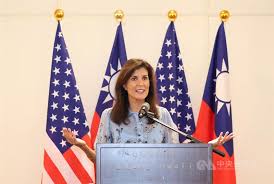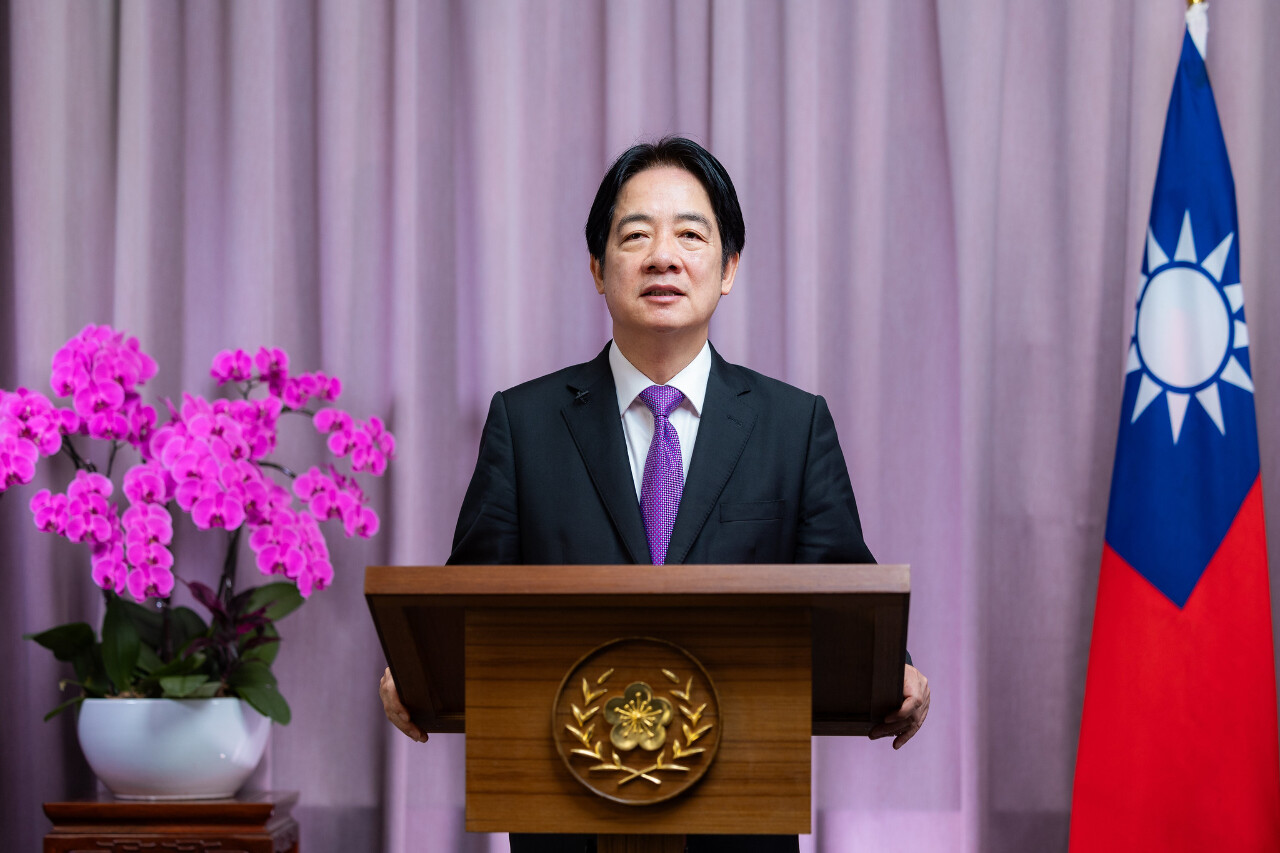2758行動已經開始
by Dave Chamberlain, Staff Writer
At this year’s Ketagalan Forum in Taiwan, former U.S. Ambassador to the United Nations Nikki Haley delivered a keynote address that captured significant attention. She asserted that Taiwan should be included in the World Health Organization and granted full U.N. membership. Notably, she emphasized that “Taiwan should be a full member in the United Nations. You have every right to sit at the same table with the world’s countries” while discussing U.N. Resolution 2758.
On the same day, the Australian Senate passed a motion affirming that U.N. Resolution 2758 does not address Taiwan’s sovereignty. The motion clarifies that the sovereignty of the People’s Republic of China does not extend to Taiwan and that it should not dictate Taiwan’s future in the U.N. or its involvement in U.N. agencies.
Although the timing of these two events is likely coincidental, it highlights a renewed focus on Resolution 2758 that merits further exploration.
在今年的台灣凱達格蘭論壇上,前美國駐聯合國大使妮基·哈利發表了備受關注的主題演講。她主張台灣應該被納入世界衛生組織並獲得完整的聯合國會員資格。值得注意的是,她強調「台灣應該是聯合國的完全成員。你們有權與世界各國坐在同一張桌子上」,並討論了聯合國第2758號決議。
同一天,澳大利亞參議院通過了一項動議,確認聯合國第2758號決議並未涉及台灣的主權。該動議澄清中華人民共和國的主權並不延伸至台灣,且不應該決定台灣在聯合國或其相關機構的未來參與。
儘管這兩個事件的時機可能只是巧合,但它突顯了對第2758號決議的新關注,值得進一步探討。
The General Assembly has decided to restore all its rights to the People’s Republic of China and to recognize its representatives as the sole legitimate representatives of China at the United Nations. It also mandates the immediate expulsion of representatives of Chiang Kai-shek from their unlawful positions at the U.N. and related organizations.
This text is from U.N. Resolution 2758, which is significant because it marks the moment in 1971 when Taiwan was effectively removed from the U.N. This resolution transferred the U.N. seat—and Security Council membership—from the Republic of China to the People’s Republic of China, a pivotal event for understanding Taiwan’s current international status. Following this, more countries began to recognize the P.R.C. over the R.O.C., leaving Taiwan with only 12 official allies today. China’s influence over U.N. institutions has played a crucial role in isolating Taiwan from various international bodies.
The P.R.C. has leveraged its U.N. seat for legitimacy, claiming it represents the “real” China. Interestingly, Mao Zedong and Zhou Enlai never argued otherwise when the Republic of China held that seat.
Recently, there has been a renewed emphasis on Resolution 2758. The 2022 White Paper on Taiwan highlighted the resolution as a legitimacy source, and its mention was noted when Nauru cut ties with Taiwan following the election of President Lai Ching-te. It was the first instance of the resolution being cited in such a context.
In July, a joint statement between China and East Timor reaffirmed the unquestionable authority of Resolution 2758, which is notable as East Timor is the most democratic nation in Southeast Asia.
This focus appears to have gained momentum in 2021. Taiwanese Foreign Minister Joseph Wu pointed out that the resolution only pertains to China’s U.N. representation and does not address sovereignty over Taiwan. In response, a Chinese spokesperson claimed that promoting “Taiwan independence” violates both the one-China principle and Resolution 2758.
On the resolution’s fiftieth anniversary, a discussion hosted by the German Marshall Fund highlighted that the P.R.C. has misused the resolution to obstruct Taiwan’s meaningful participation in international affairs. Reports published by the fund clarified that Resolution 2758 does not mention “Republic of China” or “Taiwan,” indicating it does not state an official position on Taiwan’s status, despite the P.R.C.’s claims to the contrary. This article will delve into why the P.R.C. asserts a different interpretation, despite the clarity of the resolution itself.
In April 2024, the German Marshall Fund released a report on Resolution 2758, co-authored by Glaser and Jacques deLisle, which included specific policy recommendations. Notably, the report advised:
“Collaborate among the United States, Taiwan’s diplomatic allies, and other supportive UN member states to leverage their unique strengths and collective influence to challenge the PRC’s dominance and the positions of nations backing it regarding Resolution 2758 and similar issues. Address the weaknesses in the PRC’s legal claims about Resolution 2758 and its ‘one China’ principle to counteract misinterpretations and unintentional acceptance by the UN and the global community.”
In May, Yang Tao, the director-general of the Chinese Ministry of Foreign Affairs’ Department of North American and Oceanian Affairs, stated, “The Resolution definitively settled the issue of representation for all of China, including Taiwan, in the United Nations, clarifying that there is only one China and Taiwan is a part of it, not a separate country. It also established that there is only one Chinese seat in the UN, held by the Government of the People’s Republic of China, thus eliminating the possibility of ‘two Chinas’ or ‘one China, one Taiwan.’”
This raises the question of why he asserts the resolution clearly indicates Taiwan is part of China when it doesn’t explicitly state that. To grasp this reasoning, we can refer to an editorial from the Communist Party’s Global Times in June, where academics Zhang Haipeng and Feng Lin claimed that Resolution 2758 establishes “the government of the People’s Republic of China as the sole legitimate government representing all of China in the UN, clarifying Taiwan’s status as a non-sovereign entity. Taiwan is part of China and cannot be included in Resolution 2758.”
It’s ironic that a publication like the Global Times would present such a circular argument.
在六月,前外交官約翰·塔卡奇在《自由時報》中指出,兩位美國副助理國務卿訪問台灣,但並未引起太多媒體關注。他們與約20位來自台灣盟友及其他支持國家的代表會面。正如科特尼·多諾萬·史密斯在《台北時報》中強調的:“23個國家及歐盟與兩位美國國務院高層官員在台北的會議是前所未有的。”
這表明美國正在為有關2758號決議的重要敘事推進做準備。中國是否只是對此反應,或是積極推動自身議程,則不太明確。然而,重新強調在聯合聲明中納入對該決議的提及,以及複雜地堅持其確認台灣為中國一部分的地位,則表明中國確實認為這場敘事鬥爭是重要的。
In June, former Foreign Service Officer John Tkacik noted in The Liberty Times that two U.S. deputy assistant secretaries of state visited Taiwan without garnering much media coverage. They met with around 20 representatives from Taiwan’s allies and other supportive nations. As Courtney Donovan Smith highlighted in the Taipei Times, “a meeting of 23 countries and the EU with two senior U.S. State Department officials in Taipei is unprecedented.”
This indicates that the U.S. has been preparing for a significant narrative push regarding Resolution 2758. Whether China is merely reacting to this or actively promoting its own agenda is less clear. However, the renewed emphasis on incorporating references to the resolution in joint statements, along with the convoluted insistence that it affirms Taiwan’s status as part of China, suggests that China genuinely believes this narrative struggle is important.
On July 30 at the IPAC forum in Taiwan, the Inter Parliamentary Alliance on China challenged Beijing’s interpretation of U.N. Resolution 2758 regarding Taiwan’s status. They introduced a Model Resolution on 2758 to clarify that it does not recognize Taiwan as part of China’s sovereignty, intending to have it approved by the national assemblies of IPAC members.
During the summit, President Lai criticized China’s influence tactics, stating that laws should protect fairness while history should not be used to justify aggression. He referenced Resolution 2758 as a key example of this issue.
Additionally, a motion was passed in the Australian Senate, introduced by Senators David Fawcett and Deborah O’Neill, affirming that Resolution 2758 does not grant sovereignty over Taiwan to the People’s Republic of China. The motion received unanimous support, reflecting a strong stance against China’s claims.
在7月30日於台灣舉行的IPAC論壇上,國際國會聯盟對中國對聯合國第2758號決議關於台灣地位的解釋提出挑戰。他們引入了一項關於2758號決議的模型決議,以澄清該決議不承認台灣為中國主權的一部分,並打算獲得IPAC成員國國會的批准。
在峰會期間,賴總統批評中國的影響策略,指出法律應該保護公平,而歷史不應該用來為侵略辯護。他提到2758號決議作為這一問題的關鍵例子。
此外,澳大利亞參議院通過了一項動議,由參議員大衛·福塞特和黛博拉·奧尼爾提出,確認2758號決議並未將台灣的主權授予中華人民共和國。該動議獲得全體一致支持,反映出對中國主張的強硬立場。
Revisiting Haley’s speech at the Ketagalan Forum in Taipei largely involves analyzing rhetoric:
“Taiwan has endured significant injustice for over 50 years. When the United Nations adopted Resolution 2758 in 1971, it granted the Communist Party the authority to represent China. Since then, Beijing has asserted that this resolution makes Taiwan a part of China. However, that is not the case; the resolution does not mention Taiwan at all. The U.S. and its allies should have highlighted this from the beginning, but instead, Beijing continues to dictate the narrative.”
However, if officials from democratic nations consistently challenge the resolution whenever they reference Taiwan, the overall impact will be considerable.



